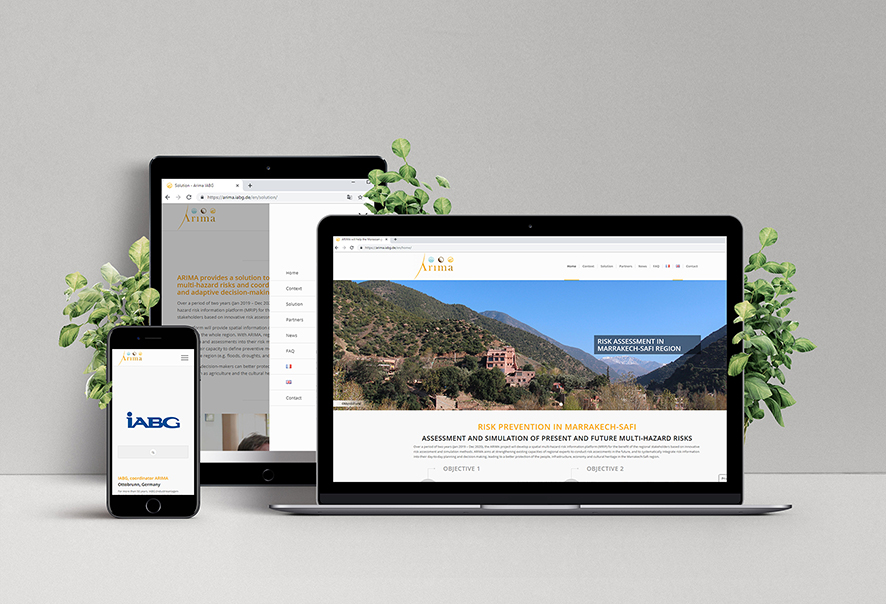Assessment and Simulation of Present and Future Multi-Hazard Risks
A consortium led by IABG, Funding by European Commission
Jan 2019 – July 2021







Context:
With increasing global awareness of climate change, coastal areas face significant risks from rising sea levels, erosion, and extreme weather events. These risks threaten infrastructure, ecosystems, and human life in coastal regions. In response, ARIMA, a project led by IABG, focuses on enhancing integrated coastal protection measures to combat the impact of climate change. The project, based in Germany, develops innovative solutions to protect vulnerable coastal environments by combining cutting-edge research with practical implementations for sustainable coastal management.
IABG (Industrieanlagen-Betriebsgesellschaft mbH) is a German engineering and technology consultancy firm with expertise in developing comprehensive solutions across various sectors, including environmental protection, infrastructure, and security. Through the ARIMA project, IABG brings together research institutions, industry partners, and government stakeholders to deliver effective solutions for coastal protection.
Objectives:
The ARIMA project has the following core objectives:
- Coastal Protection Innovation: To develop and implement innovative engineering solutions that protect coastlines from the adverse effects of climate change, particularly flooding and erosion.
- Sustainability: To promote sustainable coastal management practices that balance environmental protection with economic development and human activities.
- Climate Resilience: To enhance the resilience of coastal areas to climate-related hazards by using a combination of natural and artificial infrastructure.
- Collaborative Approach: To foster collaboration between scientific institutions, government agencies, and private sector stakeholders to deliver integrated and scalable solutions for coastal protection.
Solution:
ARIMA employs an integrated approach that combines advanced engineering, environmental science, and technology to address the challenges of climate change in coastal regions. Key components of the solution include:
- Multifunctional Coastal Structures: ARIMA develops multifunctional structures that not only protect against coastal hazards but also serve other purposes, such as tourism, energy generation, and habitat creation for wildlife.
- Nature-Based Solutions: The project emphasizes the use of nature-based solutions, such as the restoration of wetlands and dunes, to work in harmony with natural processes for long-term coastal protection.
- Monitoring and Data Analytics: IABG incorporates cutting-edge monitoring and data analytics systems to assess the impact of climate change on coastal regions in real time. These systems inform decision-making processes and optimize the effectiveness of protection measures.
- Stakeholder Collaboration: ARIMA involves close collaboration with local communities, governmental bodies, and private industry to ensure that the solutions are both technically feasible and socially acceptable. Workshops, seminars, and joint planning sessions are part of the collaborative approach.
Results:
The ARIMA project has achieved significant milestones in advancing coastal protection efforts:
- Enhanced Coastal Resilience: The innovative solutions developed by ARIMA have successfully enhanced the resilience of several coastal regions in Germany and other countries, reducing the impact of flooding and erosion.
- Sustainable Infrastructure: The multifunctional coastal structures developed under the project have demonstrated long-term sustainability, providing not only protection but also economic benefits through renewable energy generation and enhanced tourism infrastructure.
- Scientific and Technological Advancements: ARIMA has contributed to significant scientific advancements in coastal protection technologies, including the application of digital simulations, AI-driven monitoring, and climate impact forecasting.
- Successful Stakeholder Engagement: The collaborative approach fostered by ARIMA has led to increased cooperation between government bodies, environmental organizations, and industry stakeholders, resulting in more comprehensive and widely accepted coastal protection strategies.
- Global Recognition: The project has gained international recognition as a model for integrated coastal protection, with potential for adaptation and scaling in other coastal regions worldwide.
In conclusion, ARIMA has demonstrated how a collaborative, science-driven approach to coastal protection can mitigate the risks of climate change while promoting sustainable development. The project continues to contribute to the resilience and sustainability of coastal regions, setting a precedent for global climate adaptation efforts.
Context:


